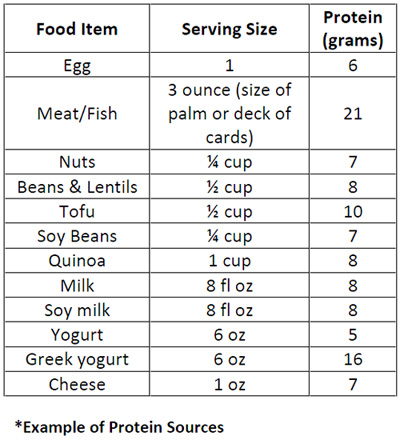By Jessica Brown, RD, CNSC, CSP, clinical dietitian at CHOC Children’s
As the summer is approaching student athletes start thinking about their goals for the upcoming sport’s season. Attempting to gain weight and bulk-up in the off season is a common goal of athletes in competitive strength and power sports. Here are a few tips to gain weight safely and effectively to improve performance in one’s sport.
Ten Quick Tips for Weight Gain:
1. It’s not just about the protein
Sufficient calories and strength training are required to build lean body mass. In fact, energy intake is more important at eliciting increased muscle mass than protein alone.
2. Robustness was not built in a day
A safe weight gain is 1 pound per week. To achieve this weight gain, an additional 300-400 calories per day are required. Adequate daily protein intake for weight gain is 0.75g/pound of body weight (for example: an athlete with a weight of 150 pounds would require 110 grams of protein per day). Weight gain should be gradual, rapid weight gain may result in excess fat.
3. Time to think about protein timing
Studies have demonstrated that 10-20 grams of protein consumed in close proximity to exercise promotes increases in muscle mass. Consuming protein at regular intervals throughout the day (5-6 times per day) can maximize muscle building. 
4. Pondering protein quantity
Thinking a little is good more is better is not the case when it comes to protein. It has been shown that 20 grams protein is the maximum amount to build muscle. Frequently consuming protein in excess of 20 grams per meal may actually lead to decreasing the body’s response to smaller amounts of protein resulting in decrease muscle building.
5. It may be cliché, but breakfast is the most important meal of the day
Protein breakdown continues after an overnight fast until adequate energy and protein are consumed.
6. Don’t fall victim to the “Train but Less Gain” club
Eating at regular intervals throughout the day without skipping meals leads to improved training outcomes, and faster recovery. Additionally, athletes who do not skip meals during the day have lower body fat percentages and higher lean body mass.
7. Remember the three R’s of recovery to optimize training outcomes:
Rehydrate – consuming fluid after exercise replaces what your body lost from sweat
Replenish– consuming carbohydrates after exercise replenishes your stores and decreases muscle breakdown
Repair – consuming protein after exercise improves recovery and growth of muscle
8. Be supplement smart with “weight gain” powders and shakes
Dietary supplements are not well standardized. What is stated on the label and what is actually in the product may be two different things. Some supplements contain ingredients not listed on the label that are prohibited by the doping regulations of national and international sport governing bodies. Athletes should attempt to obtain their protein requirements from whole foods. Current research demonstrates that protein supplements are no more effective at building muscle than whole foods. In fact, the average American diet far surpasses the protein requirements of the athlete.
9. “Natural” does not equal “Safe”
If it sounds too good to be true, it most likely is. Evaluate the quality of supplements through organizations that test products:
NSF (www.nsf.org/consumer/dietary_supplements)
USP (www.usp.org/USPVerified/dietarySupplements)
ConsumerLab (www.consumerlab.com)
10. Get crazy for carbs
Adding carbohydrate to protein after workouts stimulates muscle building more than protein alone.
Example snacks: (each snack provides 400 calories & 20 grams protein)
6 Graham cracker squares
1 TBS Peanut butter
8 fl oz low-fat fruited yogurt smoothie
1 oz Pretzels
6 oz Greek low-fat fruited yogurt
8 fl oz Orange juice
½ cup Grapes
12 fl oz low-fat Chocolate milk
1 Granola trail mix bar
1 cup dry Cereal
1.5 oz Beef jerky
1 medium Apple
References:
1. Promotion of Healthy Weight-Control Practices in Young Athletes. Pediatrics. 2005;116(6):1557-1564.
2. Moore DR, Robinson MJ, Fry JL, et al. Ingested protein dose response of muscle and albumin protein synthesis after resistance exercise in young men. The American Journal of Clinical Nutrition. 2009;89:161-168.
3. Norton LE, Layman DK. Leucine Regulates Translation Initiation of Protein Synthesis in Skeletal Muscle after Exercise. The Journal of Nutrition. 2006;136:533S-S537.
4. Deutz RC, Benardot D, Martin D, et al. Relationship between energy deficits and body composition in elite female gymnasts and runners. Medicine & Science in Sports & Exercise. 2000;32(3):659-668
5. Tipton KD, Witard OC. Protein Requirements and Recommendations for Athletes: Relevance of Ivory Tower Arguments for Practical Recommendations. Clinics In Sports Medicine. 2007;26:17-36.
6. Kerksick C, Harvey T, Stout J, et al. International Society of Sports Nutrition position stand: Nutrient timing. Journal of the International Society of Sports Nutrition. 2008;5:17.
7. Position of the American Dietetic Association, Dietitians of Canada, and the American College of Sports Medicine: Nutrition and Athletic Performance. Journal of the American Dietetic Association. 2009;109:509-527.
8. Coleman E. Evaluating Popular Sports Supplement. SCAN. 2008.
Get more expert health advice delivered to your inbox monthly by subscribing to the KidsHealth newsletter here.
Learn more about CHOC’s Clinical Nutrition Program
At CHOC, we specialize in providing a full continuum of pediatric nutrition services, including inpatient and outpatient services, depending on our patients’ needs.





